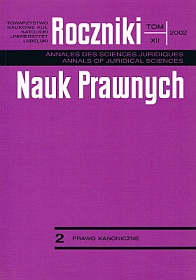Post-Communist States' Ecclesiastical Policies. The Main Lines
Abstract
The paper is a lecture delivered at a session organized by the Catholic News Agency in Warsaw on April 14, 2001. At the beginning the author states that 'ecclesiastical policy' should be understood as the whole of the principles and aims that guide the state authorities in their relations with ecclesiastical organizations as well as the methods of their implementation in social life. During the formation of these policies in the post-Communist states of Central and Eastern Europe two phenomena occurred: 1) systemic transformations leading from Communist totalitarianism to liberal democracy, and in consequence, the end of a plan to make the society atheistic; and 2) the model role of the new legal regulations decided upon in Poland in 1989.
In the author's opinion, the following belong to the main principles which occurred in those states' ecclesiastical policies in the legal aspect: 1) respect for religion as a lasting element in the national culture; 2) guarantee of religious freedom in the individual dimension; 3) rules of institutional relations between the State and the Church: respect for autonomy and independence of the Church in performing its mission; co-operation between the State and the Church for common good, regulation of the relations between the State and the Church in the form of bilateral agreement, and especially in the form of concordat between the Apostolic See and the given state.
Post-Communist states in their ecclesiastical policies base themselves on the principle of neutrality of the view of the world. However, it is not in the French version (closed neutrality), but in the version reminding of the German one (open neutrality). Only in the Russian Federation a tendency occurred to give the State a denominational character by formally recognizing the priority of the Russian Orthodox Church.
Copyright (c) 2002 Roczniki Nauk Prawnych

This work is licensed under a Creative Commons Attribution-NonCommercial-NoDerivatives 4.0 International License.


